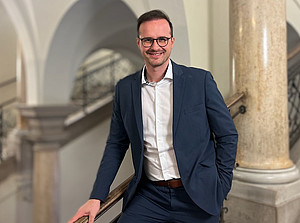Prof. Dr. Thomas Gremsl
Thomas Gremsl has been University Professor of Ethics and Social Studies since April 2022. He previously worked as a postdoc and university assistant. Until the retirement of Prof. Dr. Leopold Neuhold, he was his assistant. He is also the founding chairman of the Ethics Committee of Graz University of Technology and a postdoctoral researcher at the Lucerne Graduate School in Ethics at the Institute for Social Ethics ISE at the University of Lucerne. Some of his work has received awards from the Faculty of Catholic Theology at the University of Graz and from the Federal Ministry of Education, Science and Research (Award of Excellence). Professor Gremsl is also involved in a wide range of voluntary work.

Selected publications
In view of the increasing digitalization of our lives with regard to algorithms and socio-technical (AI) systems, (social) ethics is particularly called upon to open up perspectives on how to shape this change in a humane way. In this context, the question of the role and position of the "human factor" within these structures is becoming increasingly important. Even in the most popular sport in the world, soccer, which is otherwise so rich in tradition, technical systems (goal-line technology - GLT, video assistant referee - VAR) are increasingly being introduced and are leading to new challenges, especially in the context of refereeing decision-making processes. For this reason, this paper will focus on the relationship between humans and AI and the need for ethical and legal regulation of these systems, as well as sport ethical highlights and values and ethical principles that should open up such perspectives. Algorithms and socio-technical (AI) systems must ultimately be designed in such a way that people remain at the center.
On the way to a value system for the digital age
Big data, e-learning (also, but not only, boosted by the pandemic since 2020), the growing digital footprint in social networks, the real scenario of seamless (self-)surveillance, increasing automation in the world of work and the ongoing boom in digital end devices (including their environmental costs) are just a few examples of the rapid changes on the road to digitality. On the other hand, there is a growing unmet demand for workers, particularly in the care, service and manufacturing sectors.
In this anthology, the editors and Christian Blasge, Armin Grunwald, Theresia Heimerl, Herbert Hracovec, Katrin Otrel-Cass, Martina Schmiedhuber, Peter Strasser, Franz Winter and others address the question of how society should deal with these new challenges and the resulting uncertainties. How much digitalization and mechanization are compatible with a good life for all people and their environment? The authors state that the individual and societal need for normative orientation is growing, but that the discourse on a sustainable value system for the digital age has only just begun. Ethics and religion(s) are challenged to make a constructive contribution to this by focusing on the well-being of all people, critically questioning the paths and goals of global change and opening up and promoting perspectives for a humane shaping of the digital transformation.
The European Commission has presented a draft for an Artificial Intelligence Act (AIA). This article deals with legal and ethical questions of the datafication of human emotions. In particular, it raises the question of how emotions are to be legally classified. In particular, the concept of "emotion recognition systems" in the sense of the draft Artificial Intelligence Act (AIA) published by the European Commission is addressed. As it turns out, the fundamental right to freedom of thought as well as the question of the common good and human dignity become relevant in this context, especially when such systems are combined with others, such as scoring models.
Current research projects
Project: The protection of mental privacy in the area of neuroscience - legal and ethical challenges (Neurorights)
Project management: Thomas Gremsl together with Guilherme Maia de Oliveira Wood, Juliane Jarke, Elisabeth Staudegger
Call for proposals: -
Funding body: European Parliament/European Commission
Duration: 1.11.2023 - 30.04.2024
Project: AutoML between future potential and new challenges: A field of tension between ethics, technology and economy (CheckAutoML)
Project management: Thomas Gremsl (in cooperation with Stefan Thalmann and the BANDAS Center at the University of Graz)
Call for proposals: "Technology Assessment: Artificial Intelligence", 16th call for proposals of the Styrian Future Fund
Funding body: Zukunftsfonds Steiermark; Office of the Styrian Provincial Government
Duration: 01.03.2024 - 28.02.2025
Project: For dignified ageing with technology: Interdisciplinary approaches for the interaction of neurotechnologies, artificial intelligence (AI) and people with dementia in Styria (MemorAI Styria)
Project management: Thomas Gremsl together with Guilherme Maia de Oliveira Wood, Juliane Jarke, Elisabeth Staudegger
Call for proposals: "Technology Assessment: Artificial Intelligence", 16th call for proposals of the Styrian Future Fund
Funding body: Zukunftsfonds Steiermark; Office of the Styrian Provincial Government
Duration: 01.03.2024 - 28.02.2025
Project: Smart Regulation of and by Low or No Code Development Platforms for AI in organizations (Sm-AI-R)
Project management: Reinhold Esterbauer, Thomas Gremsl, Juliane Jarke, Bettina Kubicek, Stefan Storr, Stefan Thalmann
Call for proposals: xx
Funding body: University of Graz (Smart Regulation profile area/Rectorate)
Duration: 01.02.2024 - 30.06.2027